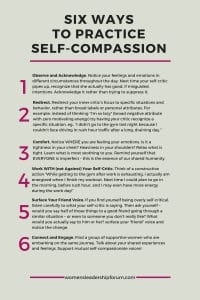Turning Your Self-Critic From Saboteur Into Supporter
What is self-compassion? Simply stated, it’s being understanding and kind to yourself. Remember that this is not self-indulgence – far from it.
In the short-term (for example, during highly stressful or busy times such as the holidays) self-compassion is the quickest and most effective way to rebound from setbacks. Over time, it can become a key practice to help all of us build the resilience needed for long-term, sustainable success and satisfaction.
Like so many topics we address in WLF, self-compassion may be easy to define but is not always easy to practice. The biggest challenge of all for many women (including myself!) is learning to work with our self-critics. (Note that I said “with” and not “against” – more on that later.)
But first, here’s a quick reflection on self-criticism and self-compassion in practice.
Think of a situation at work that did not go well. . . in fact, think of something that went really, really badly. Keeping this situation in mind, read through the two paths below.
SELF-CRITICISM PATH
Step 1: Escalation. I’m a loser, I can’t believe I messed this up; everyone is going to think I’m incompetent. I AM incompetent. I’m going to be fired.
Step 2: Avoidance. Even though I feel terrible, it will be even worse if people see how this is affecting me – I have to keep a stiff upper lip.
Step 3: Isolation. I can’t keep up this façade any longer – I need to hide from the world.
Results: This process can lead to obsessive thinking and a downward spiral. I’m going to get fired any day now. Will anyone else hire me? Maybe I’m in the wrong field – but I have so many law school loans that I have no choice but to stick with it. My spouse is going to leave me).
SELF-COMPASSION PATH
Step 1: Acknowledgement. Well, that didn’t go well. This feels bad. In fact, it REALLY hurts.
Step 2: Acceptance. I am not perfect – and that’s OK. Pain and imperfection are part of the shared human experience. In fact, all of the people I admire most make mistakes sometimes. I am not alone.
Step 3: Reflection. How can I comfort and care for myself in this moment of setback/failure/disappointment? I think I’ll take a quick walk to get some coffee. What would I tell my best friend if s/he were going through the same thing? THAT’s what I’ll tell myself.
Results: This process leads to deeper reflection (What have I learned from this experience? What’s next?) and ultimately growth and progress
You’ve just experienced self-criticism and self-compassion in practice. What did you notice about each path? How did the two paths feel? It may have been really hard to be OK with making a mistake. Notice that! Remember you are human.
At this point, some of you may be thinking “Death to my self-critic! I’m so on board with self-compassion.” Others among you may be struggling to relinquish the notion that self-criticism is motivating, and feel that that the self-compassion path let you “off the hook.” And revisiting those negative emotions – on both paths – probably still felt pretty bad. This is precisely why understanding self-compassion practices is just as important as learning about the theory.
The irony is, both our self-critical AND our self-compassionate voices are striving for the same goal – to help us achieve better outcomes. So, it is a mistake to treat our self-critics as “The Enemy.” What’s more, self-critical voices do not come with an automatic mute button – and trying to squelch your self-critic can actually have even more detrimental results! (I can’t even tame my own self-critic? I really AM hopeless!)
Try These 6 Self-Compassion Practices
When you feel yourself being pulled down the path of self-criticism, try out one of these 6 different self-compassion options (you can also print this image as a worksheet to keep at your desk!):

Observe and Acknowledge. Notice your feelings and emotions in different circumstances throughout the day. Next time your self-critic pipes up, recognize that she actually has good, if misguided, intentions. Acknowledge it rather than trying to suppress it.
Redirect – Redirect your inner critic’s focus to specific situations and behavior, rather than broad labels or personal attributes. For example, instead of thinking “I’m so lazy” (broad negative attribute with zero motivating energy), try having your critic recognize a specific situation, e.g., “I didn’t go to the gym last night, because I couldn’t face driving in rush hour traffic after a long, draining day.”
Comfort. Notice WHERE you are feeling your emotions. Is it a tightness in your chest? Heaviness in your shoulders? Relax what is tight. Learn what is most soothing to you. Remind yourself that EVERYONE is imperfect – this is the essence of our shared humanity.
Work WITH (not Against) Your Self-Critic. Think of a constructive action. For example, “While getting to the gym after work is exhausting, I actually am energized when I finish my workout. Next time I could plan to go in the morning, before rush hour, and I may even have more energy during the work day!”
Surface Your Friend Voice – If you find yourself being overly self-critical, listen carefully to what your self-critic is saying. Then ask yourself – would you say half of those things to a good friend going through a similar situation – or even to someone you don’t really like? What would you actually say to him or her? Surface your “friend” voice and notice the change.
Connect and Engage. Find a group of supportive women who are embarking on the same journey. Talk about your shared experiences and feelings. Support mutual self-compassionate voices!
These practices won’t always come easily. Remember, we can even choose to find some humor in the fact that we will often fail in our efforts to embrace failure. So above all. . . be kind to yourself on your self-compassion journey.
Are you an alum of the Women’s Leadership Forum? We’d love to keep in touch with you! Request to join us in our private Facebook group, or connect with Susan on LinkedIN and send me a note that you’d like to be part of our exclusive LinkedIn group. Also follow us on Instagram for frequent reminders of WLF content!
